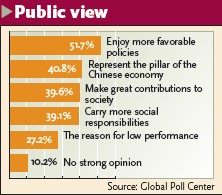SOEs need competition: poll

Chinese people were split on the question about whether State-owned enterprises (SOEs) monopolize the markets although more than 60 percent would like to see fair competition between them and other types of enterprises, a recent survey showed.
The telephone poll was conducted by the Global Poll Center under the Global Times. Pollsters interviewed adults in Beijing, Shanghai, Guangzhou, Chengdu, Changsha, Xi'an and Shenyang, between September 26 and November 10.
When asked which type of enterprises make the most contribution to China's society and economy, 42.3 percent of 1,105 respondents picked SOEs, 22.9 percent said privately-owned enterprises, 15.8 percent said joint ventures and only 5.6 percent picked foreign-owned enterprises.
In terms of their impressions of SOEs, 51.7 percent believe that they enjoy more favorable policies than other enterprises; about four in 10 feel they represent the pillar of the Chinese economy and make great contributions to the society, and 39.1 percent thought they carry more social responsibilities than others.
Still, 27.2 percent said they should be blamed for the low performing aspects of the Chinese economy.
The public's evaluation of SOEs' management was not so positive. Only 14.5 percent gave them a "high" or "relatively high" mark while 45.4 percent said "middle" level, and 30.2 percent gave them a "low" or "rela-tively low" mark.
Nearly half the respondents said that SOEs monopolize certain areas, while 40.1 percent said that characterization was not objective.
The majority of respondents, 64.7 percent, want the government to encourage SOEs to compete with others. Nearly a fifth felt the government should give more support to SOEs, while 10.1 percent took an opposing view by saying that SOEs should be confined, and other types of enterprises should get more assistance.
The poll also found that SOEs are the second favorite among employees. About one-fifth preferred working at SOEs, less than the 42.6 percent in public service, but higher than those who preferred foreign-funded enterprises, joint ventures and private enterprises, which were 11.7 percent, 8.9 percent and 8.5 percent respectively.
The three top advantages of working for SOEs include stability, (52.8 percent), attractive salaries and benefits (47.2 percent), less pressure and competition (18.7 percent).
The three top disadvantages given were lack of personal creativity (25.2 percent), inadequate incentive mech-anism (17.6 percent) and overstaffing (14.6 percent).
Wan Jun, an economic researcher at the Chinese Academy of Social Sciences, said that the poll showed that, while recognizing SOEs' role in the national economy, the public expect SOEs to be better administered and become more market-oriented so they could play a leading role in the international market.
 0
0 






